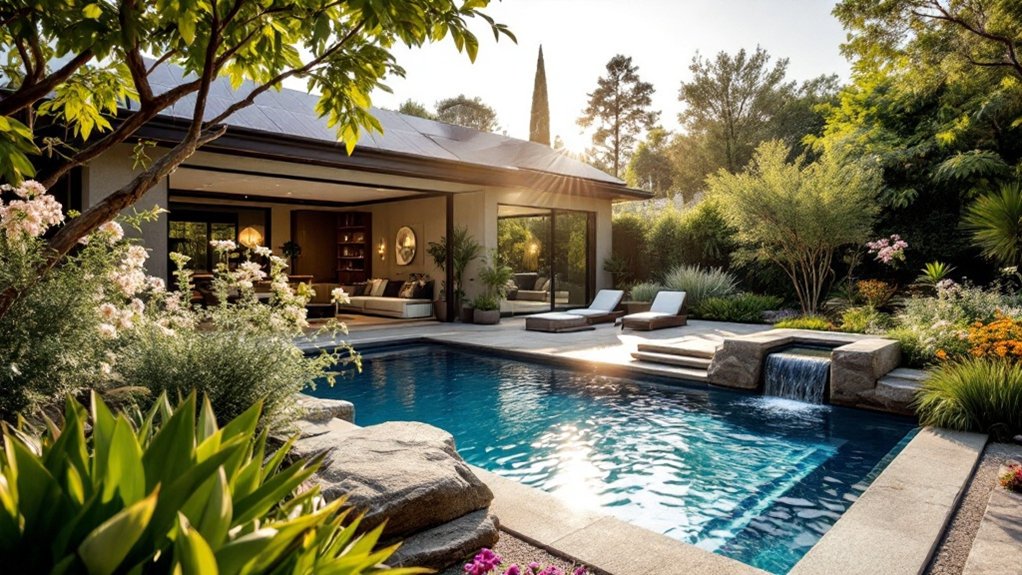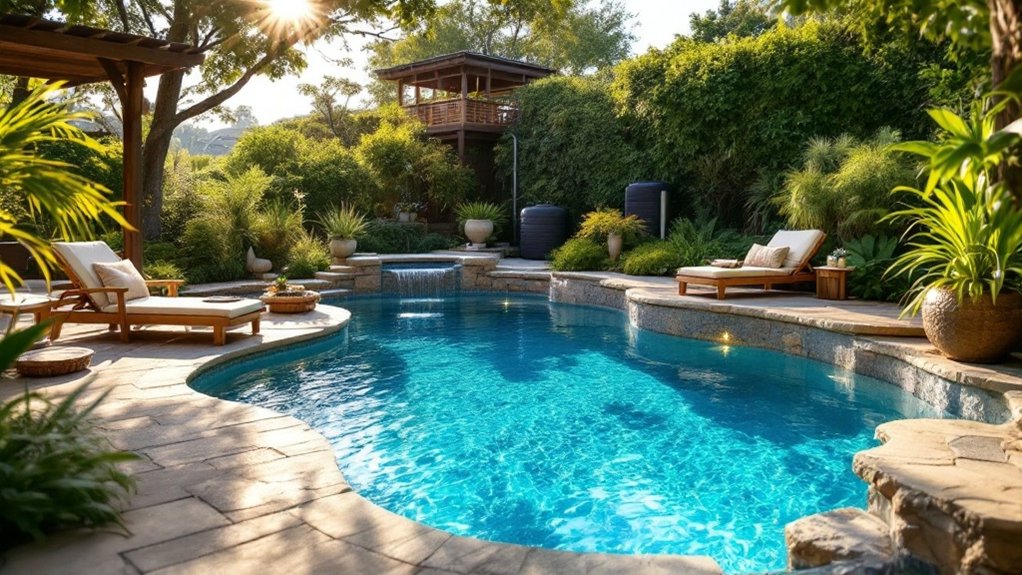Water-efficient pools present a compelling option for homeowners seeking both sustainability and cost-effectiveness. These pools incorporate innovative technologies that reduce water usage and evaporation while enhancing outdoor aesthetics. Homeowners can enjoy lower utility bills and contribute positively to the environment. However, the benefits extend beyond just savings and sustainability. Understanding the full scope of advantages could lead to a more informed decision for any prospective pool owner. What else should be considered?
The Environmental Benefits of Water-Efficient Pools
Although traditional swimming pools can consume vast amounts of water, water-efficient pools offer considerable environmental advantages. These innovative pools are designed to minimize water usage through advanced filtration systems and smart design features that reduce evaporation. By incorporating features such as covers and native landscaping, water-efficient pools can greatly decrease the overall water demand. This not only helps conserve a precious resource but also reduces the energy required for heating and maintenance. Additionally, many water-efficient pools utilize sustainable materials and construction methods, further lessening their environmental impact. The result is a swimming environment that supports both enjoyment and ecological responsibility, making them an appealing choice for environmentally conscious homeowners. Such features contribute to a healthier ecosystem and promote sustainable living practices. Furthermore, regular service and maintenance of these pools ensures optimal performance while maintaining water quality and extending the lifespan of the equipment.
Cost Savings and Financial Incentives
Water-efficient pools not only contribute to environmental sustainability but also offer significant cost savings for homeowners. By reducing water consumption, these pools lower monthly utility bills, making them a financially savvy choice. Savings can be further enhanced through the use of energy-efficient pumps and filtration systems, which consume less electricity. Homeowners may also benefit from various financial incentives, such as rebates and tax credits, offered by local governments or utility companies to encourage water conservation. These incentives can offset the initial investment in a water-efficient pool, making it more accessible. Overall, the long-term financial advantages of maintaining a water-efficient pool can result in substantial savings, benefiting both the homeowner’s wallet and the environment. Additionally, regular maintenance ensures the pool remains in top condition, preventing costly repairs and prolonging the lifespan of the pool’s equipment.
Technological Advancements in Pool Design
As the demand for sustainable living grows, advancements in pool design have emerged, integrating innovative technologies that enhance water efficiency. One notable development is the use of variable-speed pumps, which optimize energy consumption while minimizing water waste. Additionally, smart pool systems equipped with sensors and automation allow for real-time monitoring of water levels, ensuring precise management of evaporation and overflow. These systems can automatically adjust chemical levels, reducing the need for frequent water changes. Moreover, advanced filtration technologies, such as ozone and UV systems, greatly improve water quality without excessive backwashing. Together, these innovations not only conserve water but also contribute to a more eco-friendly pool experience, aligning with the principles of sustainable living. Furthermore, older systems tend to be less efficient than newer ones, prompting homeowners to consider upgrades for enhanced performance.
Low Maintenance Requirements
Many homeowners seek pools that require minimal upkeep, allowing for more leisure time and less hassle. Water-efficient pools often come equipped with advanced filtration systems, reducing the need for frequent cleaning and chemical adjustments. These systems effectively manage water quality, promoting a healthier swimming environment with less manual intervention. Additionally, many water-efficient designs incorporate automated features, such as self-cleaning mechanisms and smart controls, which streamline maintenance tasks. The use of durable materials also contributes to reduced upkeep, as they are less prone to damage and wear over time. By opting for water-efficient pools, homeowners can enjoy a revitalizing swim while spending less time on maintenance, thereby enhancing their overall outdoor experience.
Enhancing Your Outdoor Aesthetics With Sustainable Choices
While creating a visually appealing outdoor space, homeowners can greatly enhance their aesthetics by incorporating sustainable choices. Water-efficient pools serve as a stunning centerpiece, often designed with natural materials that blend seamlessly into the landscape. By selecting native plants and drought-resistant landscaping, homeowners can create vibrant gardens that require minimal water, further complementing their pools. Additionally, utilizing recycled or eco-friendly materials for decking and furniture adds a unique touch while promoting sustainability. Incorporating energy-efficient lighting can illuminate the outdoor area, enhancing its beauty at night while reducing energy consumption. Ultimately, these environmentally conscious decisions not only elevate the visual appeal of outdoor spaces but also reflect a commitment to sustainability, making them a wise choice for modern homeowners.
Frequently Asked Questions
How Do Water-Efficient Pools Impact Local Wildlife Habitats?
Water-efficient pools positively impact local wildlife habitats by reducing water consumption, thereby preserving surrounding ecosystems. This conservation allows native flora and fauna to thrive, promoting biodiversity and enhancing the overall health of the local environment.
Can I Convert My Existing Pool Into a Water-Efficient One?
Converting an existing pool into a water-efficient one is possible through various methods. Upgrades may include installing a variable-speed pump, implementing a cover, and utilizing smart technology to optimize water usage and reduce evaporation.
What Types of Plants Complement Water-Efficient Pools?
Various drought-resistant plants, such as lavender, succulents, and ornamental grasses, complement water-efficient pools. These plants reduce water usage while enhancing the pool’s aesthetic, creating a harmonious environment that requires minimal maintenance and sustains local ecology.
Do Water-Efficient Pools Require Special Chemicals?
Water-efficient pools typically do not require special chemicals; however, they may benefit from specific treatments designed to enhance water quality while minimizing chemical usage. Regular maintenance is essential for ideal performance and sustainability.
How Can I Educate My Community About Water-Efficient Pools?
To educate the community about water-efficient pools, one can organize workshops, distribute informative brochures, utilize social media campaigns, collaborate with local environmental groups, and host demonstration events showcasing the benefits and functionality of such pools.
Conclusion
To sum up, water-efficient pools offer a range of benefits that extend beyond mere aesthetics. By prioritizing environmental sustainability, homeowners can greatly reduce water consumption and utility costs while enjoying a beautiful outdoor space. Technological advancements and low maintenance requirements further enhance their appeal, making these pools a wise investment. Ultimately, choosing a water-efficient pool reflects a commitment to responsible living and contributes to a healthier ecosystem, ensuring a more enjoyable swimming experience for years to come.




